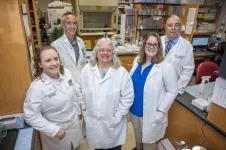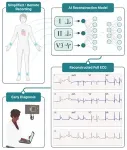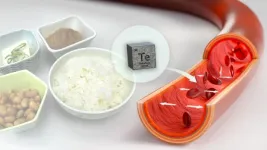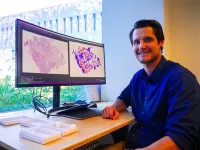(Press-News.org) AUGUSTA, Ga. (Aug. 1, 2024) – Figuring out how the tissues in our bones, adrenal glands, muscle and fat “talk” to each other could help scientists better understand what happens to our skeletons with age, when our bones tend to lose mass and become weaker, leaving us at risk for falls and fractures.
“Tissues don’t function in isolation – everything in the body “talks” to everything else to keep people healthy across the lifespan,” explains Meghan McGee-Lawrence, PhD, bone biologist at the Medical College of Georgia at Augusta University and principal investigator on a new five-year $2.4 million grant from the National Institute on Aging that aims to better understand what happens when the conversation goes awry.
McGee Lawrence and her team believe the answer may lie in how stress hormones signal the skeleton to make more bone-making cells called osteoblasts instead of bone-dissolving osteoclasts and how that changes as we age.
“So, we made a knockout (mouse) model, for the for what we thought was a key receptor that helped initiate that bone-making process. And instead of fixing the problem, it made everything worse,” McGeeLawrence says. “We figured out, long story short, that there was another receptor that we had kind of overlooked that might be driving some of these problems.”
The mineralocorticoid receptor, or MR, is best understood as a key regulator of blood pressure and is highly expressed in the kidneys and cardiovascular system but has not been widely studied in bone.
“There are a number of folks here at MCG that have done great research on MR, but in other tissue systems — in adipose tissue, in the kidney, and cardiovascular tissue, things like that,” McGee-Lawrence explains. “So, when our data started pointing towards the MR being a big driver of what's happening in the skeleton with age, we thought, well, we better go talk to the people that have dedicated a lot of time to studying that already.”
Those people included the research team at the Augusta University Adrenal Center, who study stress hormones like aldosterone, which helps regulate sodium balance and blood pressure throughout the body. Aldosterone also affects the function and creation of osteoblasts, which make bone, and osteoclasts, which dissolve and break them down.
MR also is a receptor for aldosterone. And for glucocorticoids, steroid hormones that are a key modulator of the body’s stress response.
And as with everything in the body, it’s about keeping things in balance. Too much glucocorticoid and you get results like immune system issues, hypertension and bone loss.
“Most body tissues that express MR protect themselves from the effects of excess glucocorticoids, so that aldosterone can do what it needs to do,” she explains “And what we found in bone so far is that while especially as you age, bone does express more MR, it doesn't kick in some of those same protective mechanisms to protect against glucocorticoids.”
With this new funding, McGee-Lawrence and her team want to examine local activation of glucocorticoids, which circulate through the body in inactive or active forms. “We already know that especially with aging, when MR goes up so much, the bone doesn't compensate and express a lot of the enzymes that deactivate glucocorticoids,” she explains.
Their second aim is to look at MR in bone and figure out exactly what it does. “We do that by creating these knockout models and watching what happens in the skeleton. We are also fortunate that we can overexpress it and see what happens. That really came about because our colleagues at the Adrenal Center had that model already and we were able to start using it in bone almost immediately.”
And finally, they hope to figure out the balance between MR and glucocorticoids and how, when that tips one way or the other, it affects our aging skeletons. And they believe it’s about more than figuring that balance out in bone.
“What we’ve really come to appreciate over the last number of years is that bone is actually an endocrine organ. We think of it as a structural organ – it’s your frame, it’s the levers your muscles pull on, it’s protective of your internal organs,” she says. “But there's also a lot of biological, signaling that happens from the skeleton. So, by changing something in the skeleton, you can affect a whole host of other tissues like muscle and fat, and even the adrenal glands. We’re looking at the bone first and foremost, but we also want to understand how the bone is talking to these other systems and what happens to these systems as we age.”
Along with McGee-Lawrence, co-investigators on the grant are Carlos Isales, MD, an endocrinologist and co-director of the MCG Center for Healthy Aging; Eric Belin de Chantemele, PhD, physiologist in the MCG Vascular Biology Center; Wendy Bollag, PhD, a cell physiologist who is an expert in the biology of the adrenal gland; and Kate Kosmac, PhD, from the AU Department of Physical Therapy who is an expert in skeletal muscle.
McGee Lawrence is also interim chair of MCG’s Department of Cellular Biology and Anatomy.
END
$2.4 million grant helping MCG scientists better understand what happens to our skeleton as we age
2024-08-01
ELSE PRESS RELEASES FROM THIS DATE:
Using AI, USC researchers pioneer a potential new immunotherapy approach for treating glioblastoma
2024-08-01
In an innovative new study of glioblastoma, scientists used artificial intelligence (AI) to reprogram cancer cells, converting them into dendritic cells (DCs), which can identify cancer cells and direct other immune cells to kill them.
Glioblastoma is the most common brain cancer in adults and also the deadliest, with less than 10% of patients surviving five years after their diagnosis. While new approaches such as immunotherapy have revolutionized treatment for other cancers, they have done little for patients with glioblastoma. That is partly because these hard-to-reach brain tumors ...
High blood pressure associated with environmental contamination by tellurium
2024-08-01
The likelihood of developing high blood pressure (hypertension) increases with higher levels of tellurium, a contaminant transferred from mining and manufacturing activities to foods. Improved monitoring of tellurium levels in specific foods could help decrease high blood pressure in the general population. The results of a study examining the relationship between tellurium exposure and hypertension were published in the journal Environment International.
The study was led by Nagoya University in Japan. According to Takumi Kagawa, one of the researchers involved in the ...
Pursuing the middle path to scientific discovery
2024-08-01
In electronic technologies, key material properties change in response to stimuli like voltage or current. Scientists aim to understand these changes in terms of the material’s structure at the nanoscale (a few atoms) and microscale (the thickness of a piece of paper). Often neglected is the realm between, the mesoscale — spanning 10 billionths to 1 millionth of a meter.
Scientists at the U.S. Department of Energy’s (DOE) Argonne National Laboratory, in collaboration with Rice University and DOE’s Lawrence ...
Salk awarded $3.6 million by the California Institute for Regenerative Medicine to advance research on brain aging
2024-08-01
LA JOLLA (July 31, 2024)—The Salk Institute was awarded $3.6 million by the California Institute for Regenerative Medicine (CIRM), one of the world’s largest institutions dedicated to regenerative medicine. Salk Professor Rusty Gage will lead the new CIRM-funded Shared Resources Laboratory focused on stem cell-based models of aging and neurodegeneration.
The award is part of CIRM’s latest round of funding to address challenges in the regenerative medicine field. The state agency dedicated $27 million to help establish six new Shared Resources ...
Generation X and millennials in US have higher risk of developing 17 cancers compared to older generations, new study suggests
2024-08-01
A new large study led by researchers at the American Cancer Society (ACS) suggests incidence rates continued to rise in successively younger generations in 17 of the 34 cancer types, including breast, pancreatic, and gastric cancers. Mortality trends also increased in conjunction with the incidence of liver (female only), uterine corpus, gallbladder, testicular, and colorectal cancers. The report will be published today in the journal The Lancet Public Health.
“These findings add to growing evidence of increased cancer risk in post-Baby Boomer ...
Around 160,000 joint replacement surgeries lost by COVID-19 pandemic, study finds
2024-08-01
Nearly nine months of joint replacement surgery has been lost - around 160,000 fewer operations – since the start of the COVID-19 pandemic, a new study led by the University of Bristol has found. The research suggests returning to pre-pandemic levels will not tackle the backlog, and even with rapid expansion, it will take many years, if not decades, to fix this joint replacement crisis.
The study, published in The Bone & Joint Journal today [1 August], looked in detail at the effect ...
Public health measures that reduce dementia risk could save up to £4bn
2024-07-31
Public health interventions that tackle dementia risk factors could yield as much as £4bn in savings in England by reducing dementia rates and helping people to live longer and healthier, finds a new study led by UCL researchers.
The study, published in The Lancet Healthy Longevity, shows that interventions – such as reformulating food products to reduce sugar and salt intake, introducing low emission zones to improve air quality in cities, and minimum alcohol unit pricing to reduce drinking – could have extensive benefits beyond just the health outcomes they are directly targeting.
Lead author Dr Naaheed Mukadam (UCL Psychiatry) ...
The Lancet: Nearly half of dementia cases could be prevented or delayed by tackling 14 risk factors starting in childhood, including two new risks—high cholesterol and vision loss
2024-07-31
Vision loss and high cholesterol add to 12 previously identified modifiable risk factors for dementia, concludes a new report from the 2024 Lancet Commission.
The potential to prevent and better manage dementia is high if action to tackle these risk factors begins in childhood and continues throughout life, even in individuals with high genetic risk for dementia.
New report outlines 13 recommendations for individuals and governments to help reduce risk, including preventing and treating hearing loss, vision loss, and depression; being cognitively active ...
Precision oncology via artificial intelligence on cancer biopsies
2024-07-31
A new generation of artificial intelligence (AI) tools designed to allow rapid, low-cost detection of clinically actionable genomic alterations directly from tumor biopsy slides has been developed by a team led by engineers and medical researchers at University of California San Diego.
A paper describing the new AI protocol for examining routine biopsies, called DeepHRD, was recently published in the Journal of Clinical Oncology.
Senior author Ludmil Alexandrov, Ph.D., professor of bioengineering and professor of cellular and molecular medicine at UC San Diego, says the new method is designed to save weeks and thousands of dollars from clinical oncology treatment workflows ...
What you don't know about endometrial cancer could kill you
2024-07-31
CLEVELAND, Ohio (July 31, 2024)—Despite the fact that endometrial cancer is the most common cancer of the female reproductive organs, a significant percentage of women do not know that postmenopausal bleeding is a key warning sign of the disease. Worse, even fewer women report having received any type of counseling on the subject from their healthcare professionals. That’s according to a new study published online today in Menopause, the journal of The Menopause Society.
It is estimated that 67,880 new cases of ...






